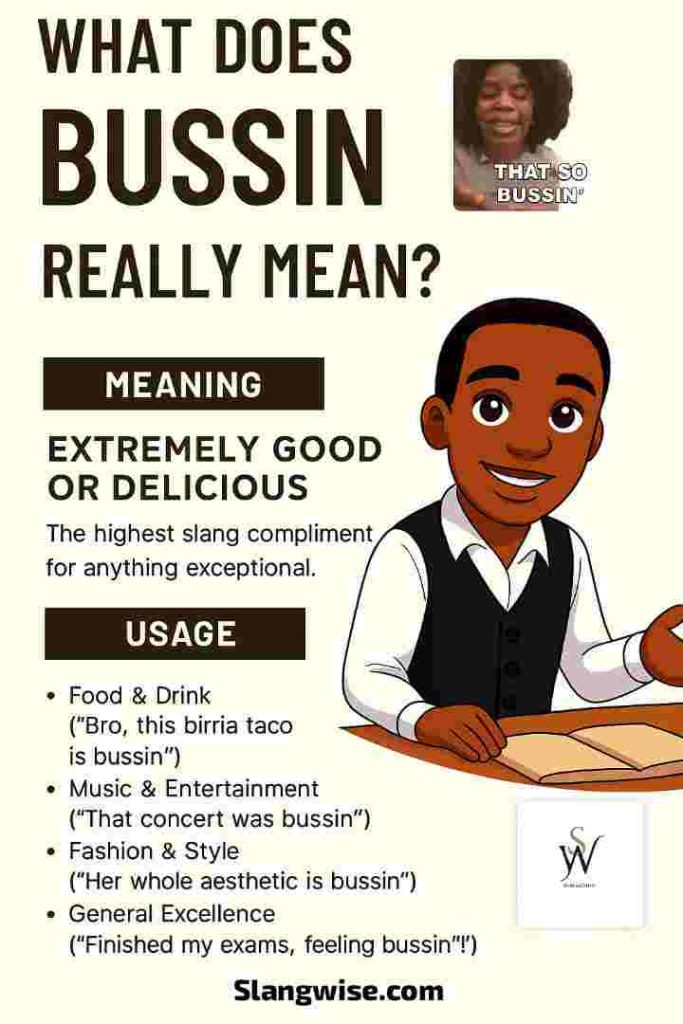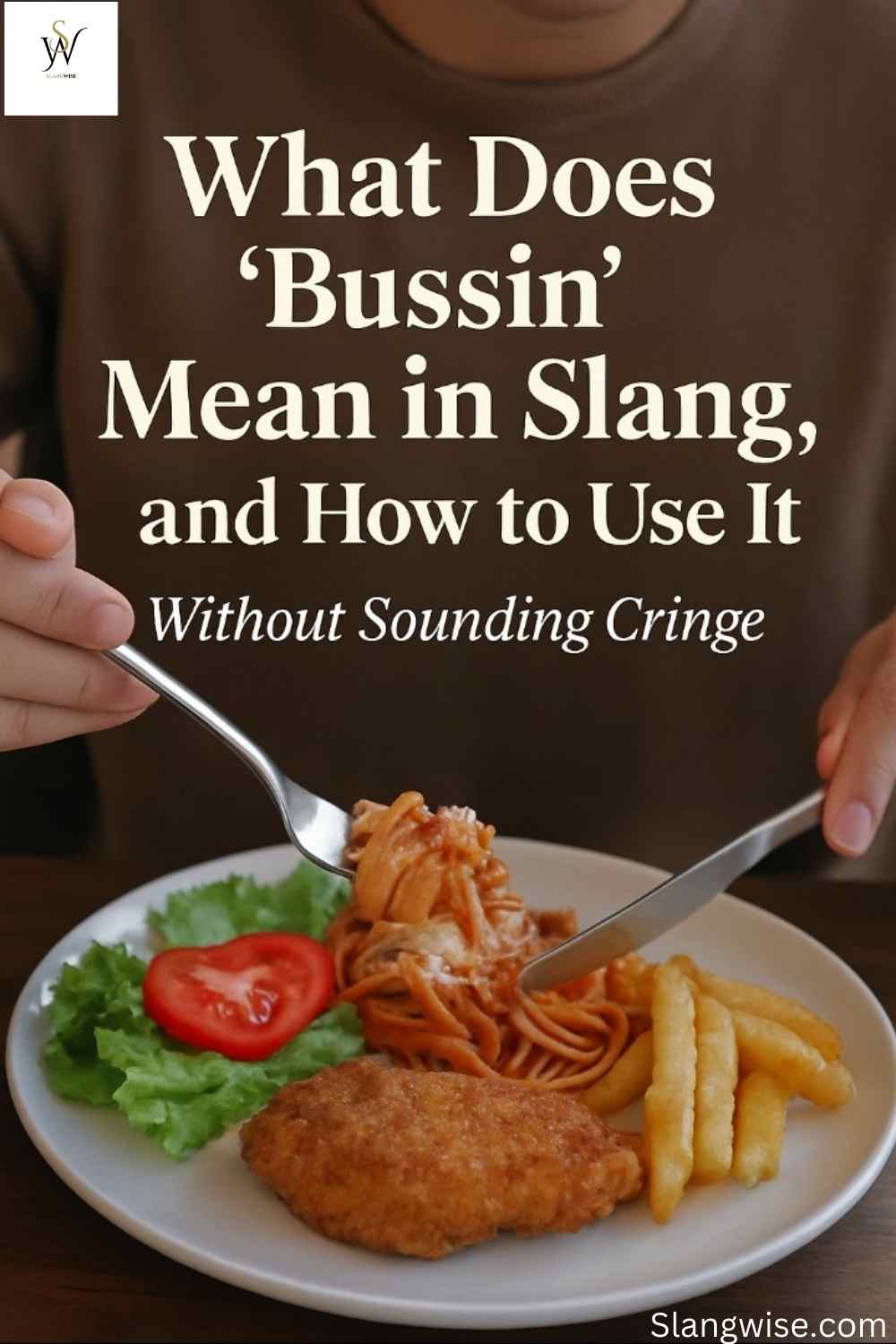Forget bland words like “good” or “tasty.” If you’ve scrolled TikTok, tuned into a gaming stream, or overheard teens chatting, you’ve likely heard something declared bussin’ (pronounced buh-SIN).
This isn’t just another fleeting internet fad. It’s the ultimate stamp of approval, signaling something isn’t just good – it’s phenomenal, top-tier, absolutely slapping.
Table of Contents
In a Nutshell

- Bussin means extremely good or delicious – it’s the highest slang compliment for anything exceptional.
- Born in African American Vernacular English (AAVE), it went viral via TikTok food reviews (2020-2021) before exploding into mainstream slang.
- While food launched it, bussin now describes top-tier music, fashion, experiences, or vibes – anything truly outstanding.
- It’s a punchy, authentic stamp of approval that signals cultural fluency, conveying intense enthusiasm in one impactful word.
Slangwise Tip: Authenticity is crucial. Bussin’ carries genuine enthusiasm. Don’t force it on something mediocre – save it for when something truly impresses you. Overuse dilutes its power.
What Exactly Does Bussin’ Mean?
Bussin in slang means “extremely good” or “delicious.” While it exploded describing mouth-watering food, its use has rapidly expanded. Today, you can call a killer song bussin’, an incredible outfit “bussin’,” or an amazing party bussin’.
It’s a versatile, high-energy superlative reserved for things that genuinely impress or delight. Think of it as the slang equivalent of “fire,” “elite,” or “chef’s kiss.”
Where Did Bussin’ Come From? Tracing the Roots
While its viral explosion feels recent, bussin’ has deeper roots. It emerged from African American Vernacular English (AAVE), where it was used to describe something exceptionally good, particularly food. Think of it as a natural evolution within a rich linguistic tradition.
Its journey to mainstream slang dominance, however, is a textbook case of internet culture at work. Around 2020-2021, TikTok became the primary engine.
Food reviewers, influencers, and everyday users tasting incredible dishes started captions and reactions with “THIS IS BUSSIN’!” The short, punchy, visually-driven format of TikTok was perfect for the term. It spread like wildfire through foodie content, reaction videos, and memes.
Soon, it jumped platforms. Twitter (now X) threads, Instagram captions, and YouTube comments were flooded with “bussin'” applied to everything under the sun – new music drops, fresh sneakers, viral trends, even positive vibes.
Its infectious energy and specificity made it stick. You can explore its evolution on resources like Dictionary.com, which tracks modern slang adoption.
How to Use Bussin’ Like You Own It
The beauty of bussin’ is its versatility. Here’s how to deploy it naturally across different scenarios:
- Food & Drink (The OG Use): This is where it feels most at home. Use it when something genuinely blows your taste buds away.
- “Bro, this birria taco is absolutely bussin’! The consommé is next level.”
- “Tried that new bubble tea spot downtown – the brown sugar milk tea is bussin’.”
- Music, Movies, & Entertainment: When a track, show, or experience hits different.
- “Did you hear the new Kendrick leak? It’s straight bussin’.”
- “That concert last night was bussin’! The energy was amazing.”
- Fashion & Style: For those fits that turn heads and get the nod of approval.
- “Your sneaker game today is bussin’. Where’d you cop those?”
- “Her whole aesthetic is just bussin’ lately.”
- General Excellence & Vibes: For anything exceptionally good or a mood that’s perfect.
- “Finished my exams, summer break starts now – feeling bussin’!”
- “The way she handled that situation was bussin’. So much respect.”
Read More: What does Spill the Tea mean – And why is it everywhere. Find out.
Why Bussin’ Matters: More Than Just a Word
Bussin’ isn’t just slang; it’s a cultural marker and a linguistic tool. Here’s why it earned its place:
- Precision & Punch: It conveys intense approval more effectively than generic terms like “good” or “great.” It instantly communicates a high level of quality or enjoyment.
- Cultural Fluency: Using it correctly signals awareness of contemporary trends, especially online and youth culture. It shows you’re plugged in.
- Economy of Language: One word does the job of several (“incredibly delicious,” “amazingly good,” “top-tier”). Perfect for fast-paced digital communication.
- Authentic Energy: It carries a raw, unfiltered enthusiasm that resonates, especially in informal settings. It feels alive.
Final Word
Bussin‘ exploded from its AAVE roots via the rocket fuel of TikTok food culture, evolving into a universal slang powerhouse for declaring something exceptional.
It’s the linguistic equivalent of a chef’s kiss or a mic drop for quality. Whether it’s a perfect slice of pizza, a chart-topping anthem, a killer outfit, or simply flawless vibes, if it’s genuinely outstanding, calling it bussin’ is the quickest, most energetic way to show your appreciation.
Use it authentically, use it enthusiastically, and use it for what truly deserves that top-tier stamp. Now go find something bussin’!
Bussin’ FAQ
Absolutely not! While it started heavily in food contexts thanks to TikTok, its use for anything excellent: music, clothes, experiences, vibes is now standard and widely accepted. Its meaning has broadened significantly.
Tread carefully. It’s highly informal slang. In casual chats with peers you know use the term? Maybe. In a formal presentation, email to your boss, or academic paper? Stick to standard vocabulary like “excellent,” “outstanding,” or “delicious.” Know your audience. Urban Dictionary captures its informal essence well.

